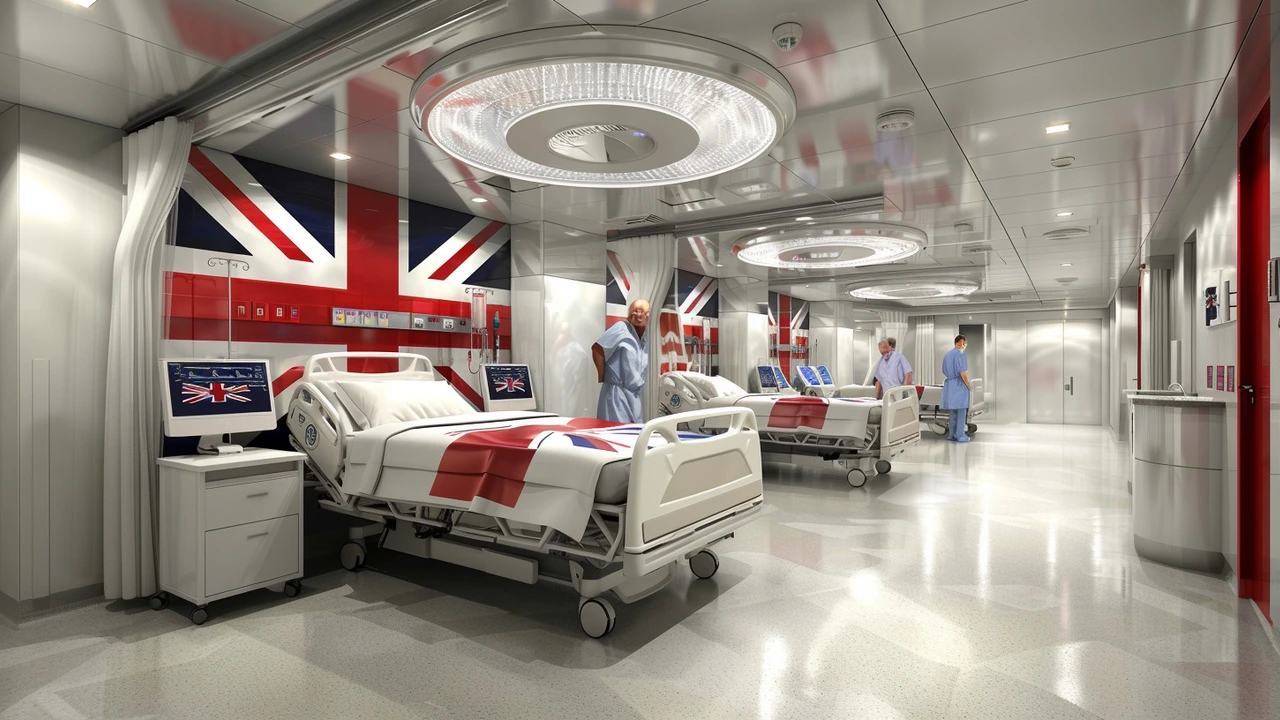How AI is Revolutionizing Precision Medicine

Imagine a world where doctors can predict illnesses before they show symptoms, and treatments are tailor-made for each individual. This isn't science fiction; it's the promise of precision medicine, amplified by the power of AI.
Precision medicine is an approach that customizes healthcare, with medical decisions tailored to the individual patient. Recognizing that each person's response to treatment is unique, this approach depends on the analysis of genetics, environment, and lifestyle.
AI is the driving force behind this revolution in healthcare. By sifting through enormous datasets, AI can identify patterns and correlations that would be invisible to the human eye. The insights gained from these analyses are then used to craft personalized treatment plans, predict diseases, and even suggest preventive measures.
- Introduction to Precision Medicine
- The Role of AI in Healthcare
- Personalized Treatment Plans
- Predictive Analytics in Medicine
- Case Studies of AI Success
- Future Prospects and Challenges
Introduction to Precision Medicine
The concept of precision medicine isn't new, but recent advancements in technology, especially the integration of AI, have brought it into the spotlight. Precision medicine is all about tailoring medical treatment to the individual characteristics of each patient. Instead of a one-size-fits-all approach, it considers factors like genetics, environment, and lifestyle to provide the most effective treatment plans.
One of the key elements driving this shift is the human genome project, completed in 2003. This was a massive leap forward, allowing scientists to understand the complete genetic blueprint of a human being. With this information, researchers could start linking specific genes to diseases. However, analyzing such a vast amount of data was a daunting task. This is where AI comes into play, making sense of the complexities involved.
AI algorithms can analyze large datasets quickly and with remarkable accuracy. These datasets include not only genetic information but also other crucial data like medical records, lifestyle habits, and environmental exposures. By dissecting this data, AI can identify patterns and predictions that humans can't easily see. For instance, it can discern which genetic mutations are likely to cause specific cancers or how a patient's environment might influence their risk of developing a chronic disease.
According to a study published in 'Nature Medicine,' AI has the potential to reduce errors in diagnosing critical conditions by up to 30%. This is because AI systems don't get tired or distracted. They can handle complex calculations non-stop, providing highly reliable results. This efficiency saves time and resources and significantly improves patient outcomes by offering more precise and effective treatments.
Take Genomics England, for example. Their 100,000 Genomes Project aimed to sequence 100,000 genomes from NHS patients with rare diseases and their families, as well as cancer patients. The insights gained have led to new diagnoses for patients and discoveries about previously unknown genetic variants. AI-powered tools have been instrumental in parsing through this vast amount of data to find meaningful connections between genes and diseases.
"AI has the potential to change healthcare by empowering physicians with better tools for disease prediction, diagnosis, and treatment," said Dr. Eric Topol, a leading figure in digital medicine.
This marriage between AI and precision medicine heralds a future where treatments are not just personalized but predictive and preventive. As more data is gathered and algorithms become more sophisticated, the scope and accuracy of precision medicine will only continue to expand. In this rapidly evolving landscape, patients will receive care that's not only more personalized but also proactive, anticipating health issues before they become critical.
The Role of AI in Healthcare
Artificial Intelligence, often referred to as AI, is playing a transformative role in the field of healthcare. The ability of AI to process and analyze large amounts of data quickly and accurately is revolutionizing how we understand and treat various medical conditions. From diagnosing diseases to creating personalized treatment plans, AI is a game-changer.
One of the most significant impacts of AI in healthcare is its ability to improve diagnostic accuracy. Through machine learning algorithms, AI can sift through massive amounts of medical data, such as imaging scans, lab results, and patient records, to identify patterns that might indicate a disease. For instance, AI systems have been trained to detect early signs of cancer in mammograms with a higher accuracy than human radiologists.
Furthermore, AI is invaluable in creating personalized treatment plans. By analyzing a patient’s genetic makeup, lifestyle, and environment, AI can suggest specific treatments or drug therapies that are likely to be the most effective for that individual. For example, in the field of oncology, AI-driven platforms are being used to recommend targeted therapies based on the genetic mutations present in a tumor, thus improving treatment outcomes.
Another exciting application of AI in healthcare is in predictive analytics. Predictive models powered by AI can foresee potential health issues before they become serious. This is particularly useful in managing chronic diseases such as diabetes or heart conditions. By continuously monitoring patient data, AI can send alerts when it detects worrying trends, allowing for early intervention and better disease management.
According to a study published in Nature Medicine, an AI system developed by Google Health was able to diagnose breast cancer with greater accuracy than human experts, reducing both false positives and false negatives.
AI is also being used to streamline administrative processes in healthcare settings, such as scheduling appointments, managing patient records, and facilitating communication between different healthcare providers. This reduces the administrative burden on medical staff, allowing them to focus more on patient care rather than paperwork.
Despite its numerous benefits, the integration of AI into healthcare also brings challenges. Issues related to data privacy, the need for continuous monitoring, and the importance of maintaining a human touch in patient care are significant considerations. However, as technology continues to evolve, so too does our ability to address these challenges effectively.
In summary, the role of AI in healthcare is vast and multifaceted. It offers the promise of faster, more accurate diagnoses, personalized treatment plans, and improved patient outcomes. As we continue to harness the power of AI, the potential for positive change in healthcare is virtually limitless.

Personalized Treatment Plans
Personalized treatment plans are revolutionizing how we approach medical care. With the help of AI, these plans can be customized to fit the unique needs of each patient. Imagine a scenario where your doctor not only considers your medical history but also analyzes your genetic makeup, lifestyle habits, and even environmental factors. This level of detail leads to treatments that are more effective and tailored specifically to you.
One of the critical ways in which AI aids in creating personalized treatment plans is through its ability to analyze vast amounts of data quickly and accurately. For example, AI algorithms can sift through thousands of patient records to identify patterns and correlations that can inform treatment strategies. This ability is crucial for conditions like cancer, where treatments that work for one patient might not work for another. By understanding the genetic differences between patients, doctors can choose therapies that are more likely to be effective.
The use of AI doesn't stop at diagnosis; it extends to ongoing care. For instance, AI can monitor patient responses to treatment in real-time and suggest adjustments as needed. This dynamic approach ensures that the treatment plan evolves based on the patient's needs. This is particularly useful for managing chronic conditions like diabetes, where maintaining a delicate balance of medication and lifestyle changes is essential.
"AI can transform our approach to healthcare by making treatments more precise, more personalized, and ultimately more effective," says Dr. Eric Topol, a renowned cardiologist and digital health expert.
AI's role in personalized treatment plans is not just limited to physical health; it can also make a significant impact on mental health care. AI-driven programs can analyze data from various sources, like social media posts or wearable devices, to identify early signs of mental health issues. This proactive approach enables mental health professionals to intervene early, offering tailored therapies that address the specific needs of each patient.
Vaccines and medications are other areas where AI is making strides. Personalized vaccines, developed based on individual genetic profiles, are on the horizon. These vaccines promise to be more effective and have fewer side effects. AI also aids in drug development by predicting how patients will respond to new medications, speeding up the process, and reducing costs.
In conclusion, AI-powered personalized treatment plans are setting a new standard in medical care. They consider the unique traits of each patient, offering more precise diagnoses and effective treatments. As technology continues to advance, we can expect even more groundbreaking developments in this field, making healthcare more responsive and patient-centered than ever before.
Predictive Analytics in Medicine
Predictive analytics is transforming healthcare by enabling doctors to anticipate and manage future outcomes. Instead of relying solely on observational data or historical records, predictive analytics uses machine learning algorithms to analyze complex datasets. This technology allows for more precise diagnoses and treatment plans tailored to the individual's needs.
One of the key advantages of predictive analytics is its ability to identify at-risk patients long before they show symptoms. For instance, by analyzing electronic health records (EHRs), AI can predict the likelihood of conditions like diabetes or heart disease. This proactive approach allows physicians to intervene early, potentially preventing the onset of these illnesses.
Moreover, predictive analytics is invaluable in managing chronic diseases. By analyzing patterns in patient data, doctors can forecast disease flare-ups or complications. This information allows for more customized care plans and better allocation of healthcare resources, ultimately improving patient outcomes. For instance, a study published in the Journal of Medical Internet Research found that AI models could predict hospital readmissions with up to 82% accuracy.
The use of predictive analytics extends beyond individual treatment to public health initiatives. AI can analyze large-scale population data to predict epidemics or outbreaks. This helps healthcare providers prepare resources and implement preventive measures more effectively. During the COVID-19 pandemic, predictive models were crucial in understanding the spread of the virus and informing policy decisions.
Another fascinating application is in drug development and personalized medicine. By examining genetic data, AI can predict how a patient might respond to a particular medication. This ensures treatments are more effective and reduces the risk of adverse reactions. A notable example is the use of AI to identify patients with a genetic predisposition to certain cancers, leading to early interventions and personalized treatment plans.
According to Dr. Eric Topol, a renowned cardiologist, "The integration of AI into predictive analytics is a game-changer in medicine. It allows us to anticipate health issues and intervene much earlier than ever before."
"Predictive analytics is not just about predicting the future; it's about creating it. By harnessing the power of AI, we can transform reactive healthcare into proactive health management," adds Dr. Topol.
However, implementing predictive analytics in medicine is not without challenges. Issues such as data privacy, algorithm transparency, and the need for robust healthcare infrastructure must be addressed. Despite these hurdles, the potential benefits of predictive analytics in medicine are undeniable. As AI technology continues to advance, its impact on healthcare will likely grow, promising a future where medical interventions are as precise as possible.

Case Studies of AI Success
There have been numerous instances where AI has shown its potential in revolutionizing precision medicine. One notable case is IBM's Watson. Watson has been deployed in various cancer research centers, helping doctors diagnose and treat different types of cancer more effectively. By analyzing patient data alongside millions of medical research papers, Watson can propose treatment options tailored to each patient. In one remarkable case, AI identified a rare form of leukemia that had eluded human doctors, leading to a life-saving intervention.
Another fascinating example is Google's DeepMind. This AI system has made significant strides in ophthalmology. Using deep learning algorithms, DeepMind's AI can detect over 50 eye diseases from retinal scans with incredible accuracy. This has the potential to save the sight of millions by detecting conditions like diabetic retinopathy and age-related macular degeneration at their earliest stages. For example, in a study published in Nature, DeepMind's performance matched that of the world's top retinal specialists.
AI's impact is not limited to diagnosis alone. Consider PathAI, a startup that has created AI-driven pathology software. PathAI's technology assists in analyzing tissue samples for signs of cancer and other diseases. This approach significantly reduces the possibility of human error, ensuring that patients receive the most accurate diagnoses. Hospitals using PathAI have reported higher detection rates of early-stage cancer, which is crucial for effective treatment.
Integrating AI into genomics has also yielded impressive results. Companies like 23andMe and Helix leverage AI to provide personalized health insights by analyzing individual genetic data. With AI algorithms sifting through genetic markers, these companies can offer predictions about health risks and suggest preventive measures. This personalized approach is changing how we think about wellness and disease prevention.
Moreover, AI is transforming the way clinical trials are conducted. Traditional clinical trials are time-consuming and costly, often taking years to complete. AI can streamline this process by identifying suitable candidates for trials and predicting the outcomes with high accuracy. For instance, the Alzheimer’s Disease Neuroimaging Initiative (ADNI) uses AI to analyze patient data and predict disease progression, helping in the development of new treatments faster.
Success stories in AI and precision medicine are numerous and growing. Each breakthrough brings us closer to a future where healthcare is not only reactive but proactive, where diseases are not just treated but anticipated and prevented. With ongoing advancements, AI's role in precision medicine will continue to expand, promising more personalized and effective healthcare for all.
Future Prospects and Challenges
The future of AI in precision medicine looks bright, with endless possibilities for improving patient care. As technology advances, AI systems are becoming even more adept at processing and analyzing complex medical data. One exciting prospect is the development of AI-driven diagnostic tools that can provide real-time insights during patient visits. These tools could help doctors make quicker and more accurate diagnoses, reducing the time patients spend waiting for results and starting treatments sooner.
There is also significant potential for AI to assist in the development of new drugs and therapies. By analyzing data from clinical trials and existing medical research, AI can identify promising compounds and predict their effectiveness, helping researchers bring new treatments to market faster. This can be especially beneficial for rare diseases that may not have enough research or focus otherwise. For instance, AI can simulate biological processes and predict how different drugs will interact with various molecular targets, streamlining the drug discovery process.
However, these advancements come with their own set of challenges. One major issue is the ethical use of AI in healthcare. Ensuring patient data privacy and security is paramount, as medical records contain sensitive personal information. There needs to be stringent regulations and standards to protect this data from misuse or breaches. In addition, there's the question of bias in AI algorithms. If the data used to train these algorithms is not diverse or representative, it can lead to skewed results and disparities in healthcare outcomes. Addressing these biases requires careful consideration and ongoing efforts to include diverse datasets during the development phase.
Another challenge is the integration of AI into existing healthcare systems. Hospitals and clinics need to invest in infrastructure that supports AI technologies, which can be costly and time-consuming. Moreover, healthcare professionals must be trained to use these new tools effectively. There can be resistance to change, especially if the benefits are not immediately clear. Ongoing education and demonstration of AI's potential benefits are crucial for widespread adoption.
The financial aspect is another hurdle. Developing and implementing AI technologies can be expensive, and there’s a need for funding and investment from both public and private sectors. Encouraging partnerships and collaborations between tech companies, researchers, and healthcare providers can help pool resources and drive innovation.
Despite these challenges, the future of AI in precision medicine is promising. As we overcome these obstacles, the goal of providing personalized, effective, and efficient healthcare becomes increasingly attainable. Dr. Eric Topol, a prominent figure in the field, once said,
"AI will not replace physicians, but physicians using AI will soon replace those not using it."This underscores the importance of embracing AI advancements to enhance medical practice. The potential to save lives, improve treatments, and build a more responsive healthcare system makes this an exciting era for precision medicine.